During Visual Arts Expo 2017 a while back, the MAGIC RAIN team had the opportunity to sit down for an interview with Pierre Sugiura! He’s a scriptwriter who has been writing series compositions and film scripts, TV dramas and anime series, for both original and adaptations. Some of his notable works would include: Yuyushiki, Barakamon and Touken Ranbu: Hanamaru.
He has also provided localised script translations for the Japanese dubs of Hollywood films such as Warner Brothers’ Storks and Lego® Batman The Movie.
Disclaimer: The contents of this interview have been mildly edited for additional reading clarity, but the meanings have not been altered.
Q: What is your first impression on Malaysia?
A: It’s my first time in Malaysia and since I just arrived last night, I have yet to roam the city. I’d like to do so after the event is over. I think the girls here are very pretty (laughs).
Q: What first inspired you to get into script writing?
A: I’m actually an actor. When I act, I usually ad-lib so it’s kind of like an impromptu acting. Even without the script, I started to really enjoy creating stories in my own head. When I write scripts, I like to imagine myself acting it out.
Q: When did you start doing script writing full-time?
A: I started doing script writing ever since I was 30 and an actor since I was 20. I also write for TV variety shows, children TV shows and even live shows. I had a programme where I had to review movies, I had to watch a lot of movies and summarize a lot of scripts just for that programme.
Q: Which do you prefer – script writing for adapted series’ or original works?
A: I prefer to do script writing for original works, even though it’s difficult.
Q: Can you share with us some of the challenges you face when script writing for original works then?
A: So, for example, in Touken Ranbu: Hanamaru, there are 47 characters. So I needed to make all the characters appear within those 12 episodes. During the 12 episodes, I had to make sure that all the characters stay in character throughout the entire show, even though there’s so many of them and very little screen time for some. I had to make sure that the characters were represented properly. Whenever I get told to make all 47 characters have their own ‘cool’ moments, I felt like puking (laughs).
Q: In Barakamon, the setting was based in a rural area. Do you particularly like making stories in rural areas or villages?
A: I grew up in a rural setting so that’s why I’m connected to that image. Do people in Malaysia actually watch Barakamon? Don’t you feel that you don’t really understand the rural areas in Japan? (laughs)
Q: In our country, anime fans prefer watching shows in its original language. Is it the same in Japan, or do Japanese prefer localised dub?
A: I prefer it to be localised dub for movies and other overseas work. Generally, in Japan, most overseas media or works will always be in dub. If you want to hear it in the original language, you’d have to change it yourself. When scripts of Hollywood movies are sent over to Japan, the script is translated. Once it is done, I will improvise the script to make it more interesting.
Q: What are the difficulties that you face when translating an English script to Japanese?
A: Sometimes, American movies have their own jokes which is very hard to translate. As long as the script is up to the timing, we’ll change the whole thing and change it to a trendy Japanese gag.

Q: You’ve mentioned that you like comedy. So is there a specific type of comedy that you like to incorporate into your scripts?
A: I like to write stories where the main character faces a lot of weird people and incidents such as in Barakamon.
Q: So when you’re script writing, is there a particular ritual that you have to do or a mindset that you have to be in?
A: Er… (laughs) I don’t really have any specific thing that I do. I’ll just laze around and when I really cannot do it, I’ll talk to this producer. The moment I call this producer, ideas might come out of nowhere (laughs).
Q: When you’re script writing, have you incorporated elements of your own personality into the characters?
A: Definitely yes. Like what I mentioned earlier, I’ll try to imagine the scene and act it out, like if I was in this situation, how would I react if it was me? Then I’ll write that down into the script.
Q: Is there a character that is most similar to you?
A: Woah… Until now… If I were to choose a character, it’d probably be Hiroshi from Barakamon. He tries his best to study, but he can’t really succeed so I feel that it’s very similar to me. Even when I was in high school, I had the feeling where I was just very ordinary and that’s similar to the character.
Q: Since you mentioned high school, did you ever think that you’ll be where you are right now?
A: In high school, I actually wanted to become a dentist. During my second year of high school, I had the unfortunate chance of meeting a lot of friends that liked to draw so because of that, I got more interested in drawing and writing. I then didn’t really go to high school (laughs). If that friend wasn’t around then, I wouldn’t be where I am right now.
Q: Can you give us any hints for any of your upcoming projects?
A: I have a lot of projects coming on, but I can’t really talk about it much now. I’d like to do some Hollywood animation like Zootopia in the future.
Q: Do you have any advice for people who want to start script writing, particularly for anime?
A: I write a script as if it happens to myself, so I can make the script more alive. I have done around a hundred types of part-time jobs so I’ve experienced a lot. Because of that, I am able to write it out into a script. When you’re still young, you should experience more things. I did a weird job before where I just needed to sit at the train station and listen to people’s complaints about their life, I didn’t need to answer them, just had to listen. It’s actually a shop where people come in and complain about their lives. So for example, a guy approached me and told me that his girlfriends is now in a sushi shop with another guy, those kind of stories. By listening to all these stories, I can stock up on a lot of ideas for my stories. Why don’t you guys try the same thing? (laughs)
With that, we’d like to thank Pierre Sugiura-san for the wonderful interview. We wish him all the best in his future endeavors!













